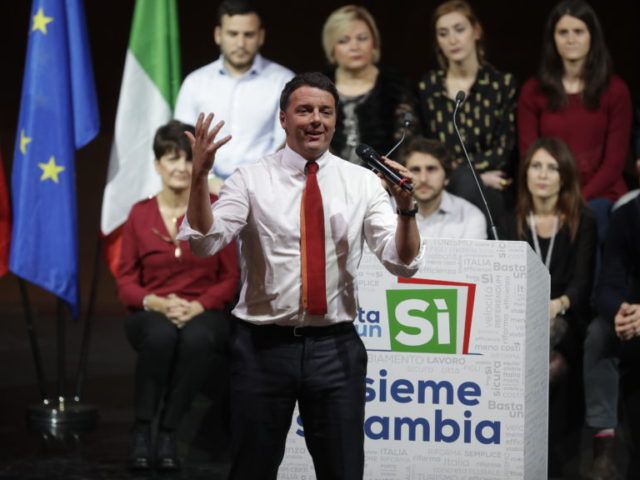This morning’s key headlines from GenerationalDynamics.com
- Sunday’s referendum in Italy threatens EU’s stability
- Referendum vote could affect stability of Italy’s troubled banks
Sunday’s referendum in Italy threatens EU’s stability

A demonstrator calls for a ‘no’ vote on Sunday (AFP)
On Sunday, Italy will vote on a referendum which, according to prime minister Matteo Renzi, will change the constitution to make Italy more governable, and more able to cope with the future.
The referendum is important in its own right, but it became geopolitically significant in January when Renzi announced that he would resign if the referendum failed. Many analysts call this an act of hubris that was unnecessary and even disastrous, but it has been done. And now the consequences are that the referendum is less about constitutional reform, and more about whether Renzi should remain in office.
After the spectacular failure of polling organizations to predict the result of Britain’s Brexit referendum or the American presidential election, no one knows whether or not to believe polls anymore. Nonetheless, many politicians are nervous, because the poll results show that the referendum is more likely to fail than to succeed.
If the referendum fails, and if Renzi keeps his promise and resigns, and if the remaining MPs in parliament cannot find a way to select a “caretaker” government that will keep things going – if all of those things occur, then there will be new elections.
It is thought that the party most likely to benefit from new elections will be the left-wing populist Five Star Movement (M5S), led by Beppe Grillo, an Italian comedian, actor, and political activist. M5S received about one-quarter of the vote in the 2013 elections, has won some major mayoral elections since then, and has become increasingly popular. And Grillo and the Five Star politicians are “euroskeptic” and have said that they’ll sponsor a new referendum on whether Italy should pull out of the eurozone, and possibly the European Union.
So, if there are new elections, and if the Five Star Movement and its euroskeptic allies come into power, and if they sponsor a new referendum, and if that new referendum is approved – if all of those things occur, then the stability of the eurozone and the European Union will be at risk.
That is a lot of “if’s” that have to happen. Nonetheless, Europe’s politicians have been unnerved by a series of populist setbacks, the main ones being the Brexit referendum and the American election, and they’re afraid that Sunday’s referendum vote in Italy will be the next one. Spiegel (Germany) and Express (London) and The Local (Italy)
Related Articles
Referendum vote could affect stability of Italy’s troubled banks
There is a completely different scenario where a “no” vote on Sunday’s referendum could threaten instability of the euro.
As we have been reporting, Italy’s Banco Monte dei Paschi di Siena (MPS), founded in 1472, and the world’s oldest operating bank, is close to collapse because it has $55.2 billion of bad loans on its book. Other Italian banks are in trouble as well, holding a total of about $383 billion in non-performing loans, about a third of the total in the entire eurozone.
MPS has been trying to avoid collapse by trying to convince investors to lend the bank another $5 billion, despite having burned through two previous large loans.
It is believed that a “no” vote on Sunday’s referendum will create enough uncertainty that Italy’s borrowing costs might rise significantly. In fact, anticipation of a “no” vote has caused investors to sell off Italian bonds, pushing yields (interest rates) up to 2%, compared to just 0.3% for German bunds.
If borrowing costs increase further, then investors could be far less interested in lending MPS the $5 billion it needs to avoid collapse, and this could have a domino effect that could catastrophically affect Italy’s entire banking system. In the most likely scenario, Italy’s government would have to bail out the banks with taxpayer money, but this is a violation of new rules set by the European Central Bank, forcing Italy out of the eurozone.
Not everyone is so pessimistic. In the optimistic scenario, it will turn out that poll results were erroneous because voters were ashamed to admit that they are voting “yes” on the referendum, just as they were ashamed to admit that they were voting for Brexit or Trump. The optimistic scenario also notes that the Wall Street stocks surged to new highs following Trumps’ election. So in this scenario, Renzi remains in office, Italian stocks surge, MPS gets it bailout money from investors, and Italy muddles through for another year. CNN and Market Watch and Stratfor
Related Articles
- Italy’s Monte dei Paschi di Siena, the world’s oldest bank, appears close to collapse (04-Nov-2016)
- Italy bank crisis more dangerous to EU than Brexit (05-Jul-2016)
- Fearing more Brexit-like votes, EU abandons fiscal rules for Spain, Portugal, Italy (30-Jul-2016)
KEYS: Generational Dynamics, Italy, Matteo Renzi, Brexit, Five Star Movement, M5S, Beppe Grillo, Banco Monte dei Paschi di Siena, MPS
Permanent web link to this article
Receive daily World View columns by e-mail

COMMENTS
Please let us know if you're having issues with commenting.